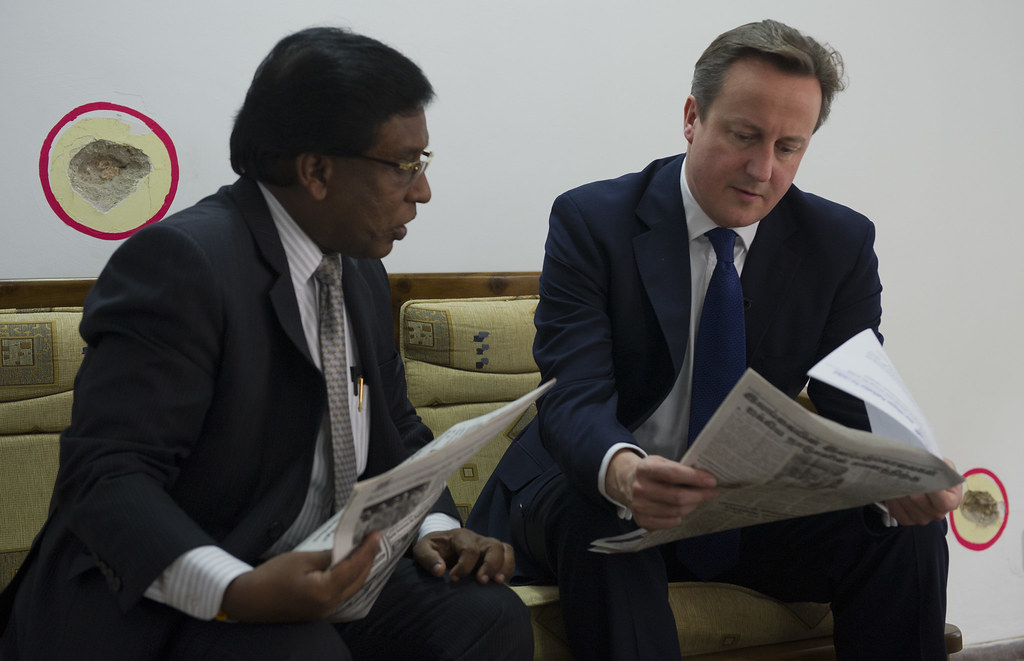
Cameron visited the office of a Tamil newspaper in Jaffna. The red circles on the wall mark bullet holes. (Number 10)
The former British prime minister has been given another chance to rectify his legacy - this time as foreign minister. Following through on his previous pledges on accountability and justice in Sri Lanka would be the best place to start.
It has been a turbulent week in British politics. Under pressure from within his party and trailing in national polls, Prime Minister Rishi Sunak announced a cabinet reshuffle that saw a familiar face return to the frontline, with former prime minister David Cameron appointed as the British foreign secretary. The move is an electoral roll of the dice for Sunak. However, this new role provides Cameron with an opportunity to rectify his previous tainted legacy and for this government to demonstrate they are committed to the rule of law, accountability, and justice on a global scale. Sri Lanka is where they should start.
The seismic events under Cameron’s previous tenure would have undoubtedly left many bitter memories. For Tamils, Cameron’s time in office will have brighter glimpses than for many others. He was the first world leader since World War II to visit Jaffna, the cultural capital of Eelam Tamils, and the first to advocate for independent international investigations into mass atrocities committed by Sri Lanka. He was a British leader who refused to shake the hands of those responsible for the Tamil genocide. He met with British Tamils before travelling to the island and came back having delivered clear messages in support of justice and accountability. Cameron acted decisively and principledly.
Out of office, however, those bright sparks seemed to have been extinguished by his apparent willingness to prioritise turning a profit over those very same principles he acted with. This year, Cameron has been drumming up support for a controversial Chinese-backed port in Sri Lanka, urging investors to pour money into the multibillion-dollar project that is being constructed by a company currently under US sanctions. Concerns have been raised across the board, including by his Conservative peers. A politician who once boldly spoke out against mass atrocities in Sri Lanka and the need to account for them, now seemed comfortable as a salesperson for the regime and its backers in Beijing.
Cameron’s change of heart was particularly dismaying for Tamils. Little has changed on the island since his visit a decade ago. The journalists he met still have not seen justice for the murder of their colleagues. The families of the disappeared that besieged his vehicles with photographs of their loved ones continue to protest on the roadsides of the North-East. The international investigation he pledged to back has been shunned by every Sri Lankan leader, including current president Ranil Wickremesinghe who Cameron met and sang the praises of this year. To this day, not a single war criminal has been held to account.
“I will never forget the faces of those I met in Jaffna,” he wrote in this paper. Yet, he seemed to have done just that.
His actions fuelled distrust, not just in Cameron as an individual but in the British government overall. It reinforced perceptions of the hollowness of British rhetoric. If even the prime minister can backtrack on his politics, how committed is Britain to its words and policies around the world?
On Monday, Cameron was granted an opportunity to rectify that. Though globally, the war in Ukraine and turmoil in Gaza may provide trickier tests, Sri Lanka, the place where he spearheaded efforts on accountability, is the most straightforward place to start. Almost 10 years to the day since his visit to Jaffna, the new foreign secretary can pick up where he left off and drive moves to take Sri Lanka to the International Criminal Court, as well as impose sanctions on those accused of the most heinous crimes. The UK has fallen far behind many of its allies who have already done the same, as well as Keir Starmer of the Labour Party who called for an ICC referral in May 2022. Showing leadership on this issue now is not too late, and it will pay off more than any Chinese-funded port.
It is not just Cameron’s personal reputation that will be on the line. Many will remember how the Conservative Party lobbied British Tamils citing Cameron’s feats in Jaffna. With the party struggling at the polls and facing the prospect of a dire general election, it needs British Tamil support now more than ever. The current government ignores them at its own peril.
We need your support
Sri Lanka is one of the most dangerous places in the world to be a journalist. Tamil journalists are particularly at threat, with at least 41 media workers known to have been killed by the Sri Lankan state or its paramilitaries during and after the armed conflict.
Despite the risks, our team on the ground remain committed to providing detailed and accurate reporting of developments in the Tamil homeland, across the island and around the world, as well as providing expert analysis and insight from the Tamil point of view
We need your support in keeping our journalism going. Support our work today.
For more ways to donate visit https://donate.tamilguardian.com.

